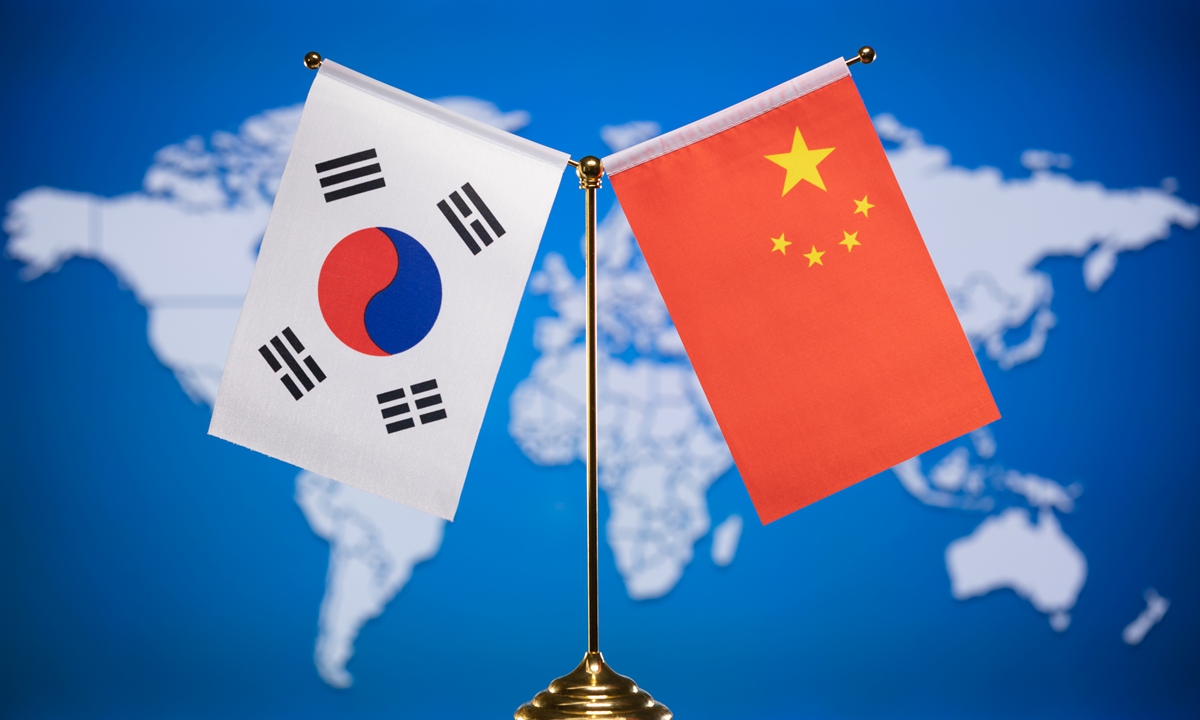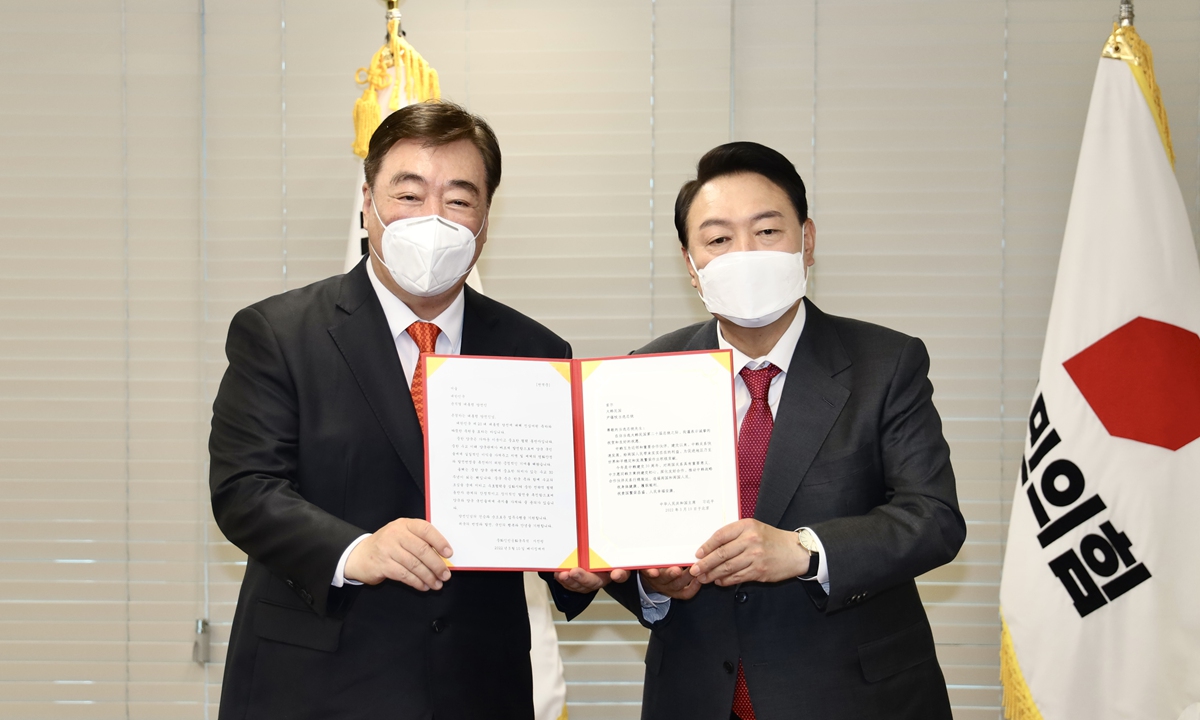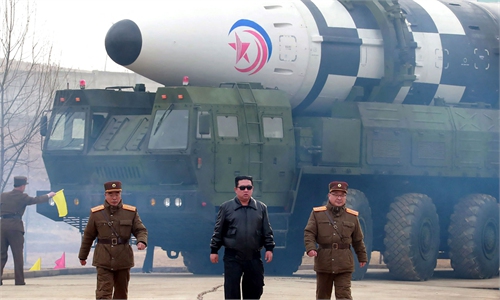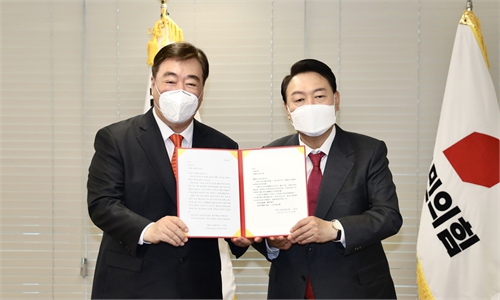Xi stresses shared responsibility in regional stability during rare phone call with SK president-elect

Photo: CFP
Chinese President Xi Jinping on Friday spoke on the phone with South Korean President-elect Yoon Suk-yeol, during which he stressed China and South Korea's responsibility in defending regional peace and promoting international prosperity, and said that China is willing to work with South Korea in building a fairer global governance system.
The Friday conversation, the first time for the Chinese leader to talk to a president-elect of South Korea, underscores the importance of the China-South Korea relations, especially amid the more complicated global and regional situations, analysts said, noting that there will be no U-turn in bilateral relations after Yoon takes office, but blindly leaning toward the US will bring no good to South Korea's relations with its neighbors or a solution to Korean Peninsula issues.
President Xi again congratulated Yoon on his election as South Korean president. Xi pointed out that China and South Korea are permanent close neighbors that cannot move away and also inseparable partners, adding that China always attaches high importance to its relations with South Korea.
Noting that this year marks the 30th anniversary of diplomatic relations, Xi said the two sides need to take this as an opportunity to further uphold mutual respect, strengthen political trust, and enhance people-to-people friendship, with a view to the steady and sustained growth of bilateral ties.
He expressed China's readiness to work with the ROK to strengthen international and regional cooperation, make positive efforts to keep global industrial and supply chains stable and smooth.
Yoon noted that South Korea and China have a long history of friendship and since the establishment of diplomatic relations 30 years ago, the bilateral cooperation has yielded great achievements. South Korea is willing to have close high-level exchanges with China to increase mutual trust, promote friendship among the peoples, and to push the bilateral relations to a higher level, according to a release from China.
At a press conference on Wednesday, Yoon's spokesperson Kim Eun-hye described the conversation as unprecedented as it would be the first time for President Xi to have a phone conversation with a president-elect in the country before Yoon is officially sworn in as head of state.
Xi's conversation with Yoon sends a friendly signal of the bilateral relations, showcasing that there will be no U-turn from the past close ties despite some tough remarks Yoon had made during the election campaign, Hwang Jaeho, a professor at Hankuk University of Foreign Studies in Seoul, told the Global Times on Friday.
South Korean media also paid wide attention to the phone call on Friday, which showed their great expectations on China attaching importance to relations with South Korea. China and South Korea have maintained direct communication between the top leaders, which is also the most effective way to settle problems, and Yoon may carry on with this method, Lü Chao, an expert on the Korean Peninsula issue at the Liaoning Academy of Social Sciences, told the Global Times.

Chinese Ambassador to South Korea Xing Haiming (left) meets with South Korean president-elect Yoon Suk-yeol at the headquarters of the People Power Party in Seoul on March 11, 2022. Photo: Chinese Embassy to South Korea
During Yoon's meeting with Chinese Ambassador to South Korea Xing Haiming on March 11, Yoon's tone toward China had already changed, Lü said, noting that China-South Korea relations will not countermarch after Yoon takes office.
Xing met with Yoon in Seoul to deliver President Xi's congratulations. During the meeting, Yoon said that he is "certain South Korea-China relations will develop further."
Hwang said that Yoon's emphasis on strengthening South Korea's alliance with the US does not mean South Korea will abandon relations with China.
Yoon stressed developing relations with China under the mutual-beneficial principle, which is different from Moon Jae-in's emphasis on mutual trust. This means there will be some changes in Yoon's policies toward China, said Hwang, noting that there is room for the two sides to interact and the phone conversation will also determine the general direction of relations.
Hwang pointed out that Yoon from the conservative opposition People Power Party edged out the ruling Democratic Party's candidate by only a small margin, which means the Democratic Party's emphasis on maintaining good relations with China was widely accepted.
Some South Korean media said that Yoon's election "could have a profound impact on the direction" of South Korea's foreign policy as he would take a hard line on national security and vowed to strengthen the alliance with the US. The US has also seen Yoon's victory as a unique opportunity to further cement ties and its small circle to compete with China. Five hours after Yoon's victory speech, at the request of the US, US President Joe Biden spoke on the phone with Yoon in which they affirmed the strength of the US-South Korea alliance, US and South Korean media reported.
After taking office in May, the first challenge for Yoon would be a series of domestic problems, including stabilizing the country's economy and preventing COVID-19. "South Korea is not the US, and is not in competitive relations with China or has geopolitical conflicts with China. Although almost all South Korean leaders have attached great importance to the US, none of them will mess up ties with China as this is also closely related to South Korea's stability," Lü said.
Some problems may also affect future relations. "The current global and regional situation has become more complicated. For example, the Russia-Ukraine clash has deeply affected the international order and may also influence China-South Korea ties," Wang Junsheng, a research fellow of East Asian studies at the Chinese Academy of Social Sciences in Beijing, told the Global Times.
Wang noted that it is highly possible that the Yoon government will lean on the US, but South Korea should also learn from previous experience. Improving relations with the US is understandable but making the US-South Korea alliance the pivot of South Korea's foreign policy at the expense of other countries will harm South Korea and China.
Analysts noted that Ukraine is a lesson to the international community on why countries should maintain independence, avoid acting like pawns of major countries to contain others, and take balanced policies among major powers.
Thorny issues
The Friday phone call was also significant to stability in the Korean Peninsula and regional stability, as the situation in the Korean Peninsula faces a possible escalation, although Yoon's policy on North Korea has not been fully formed and needs further observation, Li Kaisheng, research fellow and deputy director at the Institute of International Relations of the Shanghai Academy of Social Sciences, told the Global Times on Friday.
According to the Yonhap News Agency on Friday, Korean Peninsula issues were also discussed by Xi and Yoon with the latter calling on close cooperation with China for the stable management of the political situation on the Peninsula.
Nearly five years after its last test of an intercontinental ballistic missile (ICBM), North Korea tested a new type of ICBM, Hwasongpho-17, on Thursday, with its leader Kim Jong-un guiding the overall process of the test launch, North Korean state media KCNA reported on Friday. Analysts said that along with a series of missile launches since January, the test launch showed that it is working to have asymmetric military capability to deal with threats from the US and Japan.
Li said North Korea may act strongly to South Korea's tough stand against it, especially after Yoon takes office. Yoon described North Korea as the country's "main enemy," pledging to bolster missile defenses.
South Korea's Air Force conducted a rare training involving its F-35A radar-evading fighters in a show of air power on Friday, a day after North Korea test-fired the ICBM, Yonhap reported.
China-South Korea relations will also be challenged if the situation in the Korean Peninsula heats up, Li said.
China would highlight the significance of peaceful negotiations in solving the Korean Peninsula issue, urging the related parties, including the US and South Korea, not to get the situation caught up in a vicious cycle of confrontation, Li said.




